It’s generally fairly easy for new Linux administrators to get up and running with the basics of installing, configuring and managing Linux systems at a basic level. Truthfully, though, it takes years to get the in-depth knowledge required in many server environments today. One thing I really recommend learning early on — i.e. from the beginning — is security.
 I participate in a group of professional penetration testers (the nice folks who help you test your security as if they were the bad guys) called Charlotte Hackers Anonymous. I asked the group what they thought were the most important tips for new system administrators, and below are their tips, along with my thoughts on each.
I participate in a group of professional penetration testers (the nice folks who help you test your security as if they were the bad guys) called Charlotte Hackers Anonymous. I asked the group what they thought were the most important tips for new system administrators, and below are their tips, along with my thoughts on each.
Don Parris wears a Facility Services cape by day, and transforms into LibreMan at night. He has written numerous articles about free tech, and hangs out with the Cha-Ha crowd, learning about computer security. He also enjoys making ceviche with his wife, and writing about his travels in Perú.





 The Linux Foundation, ever in the forefront of shaping the future of Linux, has announced the 2015 Linux Training Scholarship Program, which aims to provide educational funds “to up-and-coming developers and sysadmins who show incredible promise…but do not otherwise have the ability to attend Linux Foundation training courses,” according to a page on the
The Linux Foundation, ever in the forefront of shaping the future of Linux, has announced the 2015 Linux Training Scholarship Program, which aims to provide educational funds “to up-and-coming developers and sysadmins who show incredible promise…but do not otherwise have the ability to attend Linux Foundation training courses,” according to a page on the 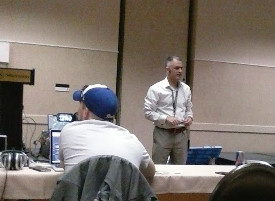

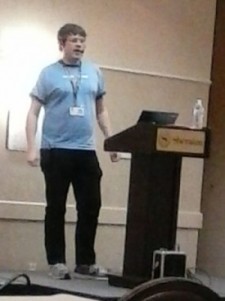
 Somehow I managed to get up on time to make the hour and a half trip from my house to the Charlotte area in plenty of time for the 9 A.M. opening, groggy from only getting about three hours sleep, then wondered why I bothered arriving early. After all, the first presentation I planned to attend wasn’t until 11:30, and with no keynote address scheduled for Friday morning, that left me with a lot of time on my hands.
Somehow I managed to get up on time to make the hour and a half trip from my house to the Charlotte area in plenty of time for the 9 A.M. opening, groggy from only getting about three hours sleep, then wondered why I bothered arriving early. After all, the first presentation I planned to attend wasn’t until 11:30, and with no keynote address scheduled for Friday morning, that left me with a lot of time on my hands.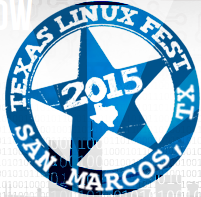

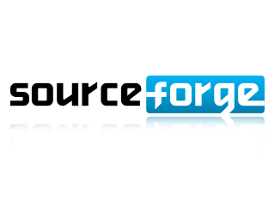
 Newer converts to open source probably don’t know much about the site, but it wasn’t long ago when Linux users were very aware of SourceForge and how to use the service, at least well enough to download software — perhaps more aware than they wanted to be. It was the go-to site when looking for a program not available in a particular distro’s repository. Not anymore. Not for a while. These days, the more important projects have either migrated to GitHub or are hosting their own.
Newer converts to open source probably don’t know much about the site, but it wasn’t long ago when Linux users were very aware of SourceForge and how to use the service, at least well enough to download software — perhaps more aware than they wanted to be. It was the go-to site when looking for a program not available in a particular distro’s repository. Not anymore. Not for a while. These days, the more important projects have either migrated to GitHub or are hosting their own.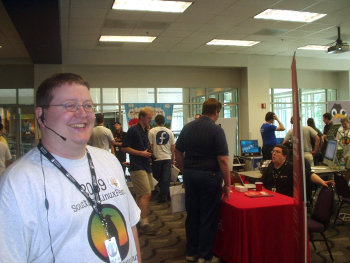
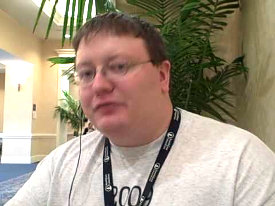

 At the height of the media frenzy that developed around Snowden’s initial revelations, there were allegations that Microsoft had not only built back doors in its software for the NSA and other government agencies to use against foreign businesses and governments, but that it was cooperating with U.S. authorities in other ways as well. For example, one report indicated that the company was passing along details of unpatched security vulnerabilities in Windows to the NSA, effectively adding temporary tools to the spy agency’s cyber arsenal.
At the height of the media frenzy that developed around Snowden’s initial revelations, there were allegations that Microsoft had not only built back doors in its software for the NSA and other government agencies to use against foreign businesses and governments, but that it was cooperating with U.S. authorities in other ways as well. For example, one report indicated that the company was passing along details of unpatched security vulnerabilities in Windows to the NSA, effectively adding temporary tools to the spy agency’s cyber arsenal.
